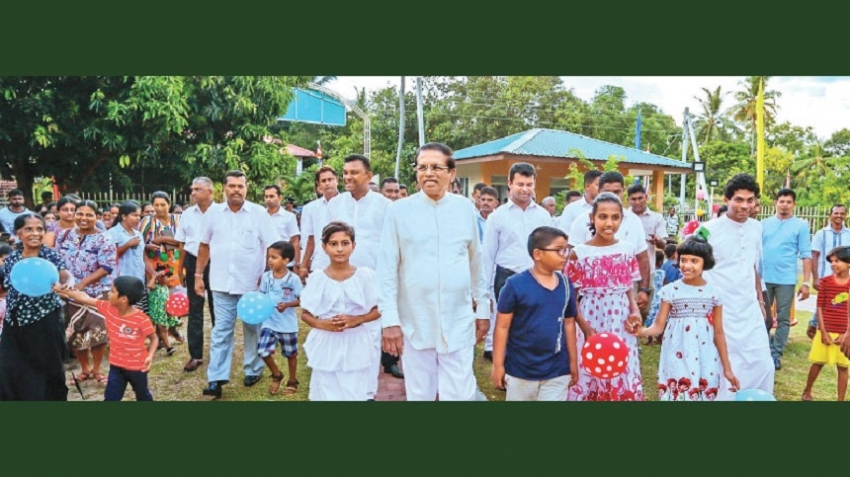The parents want the best for their children. Most children consume milk twice a day: before breakfast and after dinner. The parents believe that milk powder contributes to children’s overall well-being, especially strong immunity. However, experts maintain that the health benefit of milk is merely a marketing ploy. Similar nutrients can be absorbed from the everyday meal.
A recent exposure leads us to certain milk powder importing companies involved in a racket. A mixture of lactose powder and animal oil has been imported and sold in the local market under the guise of milk powder. Industries, Trade and Commerce Deputy Minister Buddhika Pathirana made this revelation in Parliament.
President Maithripala Sirisena criticises the multinational milk powder companies for importing substandard products to Sri Lanka. He emphasises the need to develop the local dairy industry to cater to consumer needs. President added that the consumption of some imported milk powder would not be a healthy option. However certain individuals attempt to defend the recent exposure.
Another significant issue that surfaced recently is the fall armyworm. Commonly known as the Sena caterpillar, the insect’s presence has been reported in all major maize-growing areas. It also affects the sugarcane cultivation in addition to the growing concerns over other crops including rice, according to an FAO statement. Effective management strategies suggest that the early detection of larvae makes pest elimination possible. The pesticides must be applied at the right time. In the wake of the outbreak, the farmers, along with the private sector, have opted to utilize highly hazardous pesticides. This must be avoided. Sustainable alternatives must be sought.
Food security and public health
Sri Lanka is an agricultural country. Therefore, pesticides play an important role. It concerns agriculture, food security and public health. Pesticides help farmers protect and increase the crop. In reality, however, the pesticides are designed to kill, reduce or repel insects, weeds, rodents, fungi, and other organisms that can threaten public health and national economies directly.
A special approach must be undertaken in risk assessment for infants and children. The pesticides contained in the meals can make infants and children prone to unique vulnerabilities. A child’s organs will not be fully developed. They continually experience critical periods in development. The adverse exposures can cause permanent damage, particularly in the uterus.
Pesticides have deleterious effects on neurobehavioral development among young children. Various pesticide compounds have been linked to poor neurobehavioral outcomes, including verbal, memory, response-speed, kidney damage and possibly autism among pre-schoolchildren. Schoolchildren, who are exposed to higher levels of pesticides, have a greater risk in terms of health.
A number of children are reported to have been struck by the mysterious and deadly form of kidney disease in Rajarata. Studies indicate the likely cause as pesticides and fertilizers.
President Sirisena’s direct contribution
President Maithripala Sirisena’s government is committed to conducting necessary programmes on children’s well-being. The commitment is already reflected in major achievements such as low infant and child mortality rates, the universal enrolment in primary education and high levels of immunization coverage. However, much remains to be achieved. Reducing the under-nutrition levels and poisoning remains a tough challenge.
In 2015, the UN General Assembly adopted the 2030 Development Agenda titled ‘Transforming our world: the 2030 Agenda for Sustainable Development’. The UN agencies, which are part of the United Nations Development Group, decided to support an independent campaign to communicate the new Sustainable Development Goals (SDG’s) to a wider audience.
Significant strides have been made in increasing life expectancy and reducing the common killers associated with child and maternal mortality. Between 2000 and 2016, the worldwide under-five mortality rate was decreased by 47 per cent (from 78 deaths per 1,000 live births to 41 deaths per 1,000 live births). Still, the number of children dying under five years is extremely high. It was 5.6 million in 2016 owing to various reasons.
One Sustainable Development Goal is to reduce under-five mortality to at least as low as 25 per 1,000 live births. But if the current trend continues, more than 60 countries will miss the SDG neonatal mortality target for 2030. About half of these countries would not reach the target even by 2050.
Parents can identify their child’s physical needs. That includes nutritious food, clothes to suit the climate conditions and bedtime at a reasonable hour. However, a child’s mental and emotional needs are not perceptible. Good mental health allows children to think clearly, develop socially and learn new skills. Good friends and encouraging words from adults could also help children develop self-confidence, self-esteem and a healthy emotional outlook on life. A child’s physical and mental health is quite important.
Sri Lanka has a superb preventive health care service. A large number of preventive health campaigns have been conducted for young children. The potential of such services was not harnessed to enhance child protection until President Sirisena assumed office. As a part of the preparation of a national agenda to achieve 2030 targets of the UN Sustainable Development Goals, a strategic vision has been brought out. The theme ‘Let’s Protect Children’ was put in place under the guidance of President Maithripala Sirisena with a subsequent vision of accelerating the process of children’s well-being project.
In order to accomplish the main objectives of ‘Let’s Protect Children in Sri Lanka’ national project, it is important to recognize the basic needs for a child’s physical and mental health. The stakeholders of the six-month initiative (October 2018 – March 2019) operate in 25 districts. It delineates the processes that will be established to set up platforms and common grounds for engaging children as healthy, visionary, educated, skilled, pro-active leaders in social endeavours and governance, and as innovators of economic initiatives of future.
President Maithripala Sirisena established ‘Let’s Protect Children’ National Programme in 2017. It was President Sirisena’s brainchild project to protect children and create a toxin-free society.




















